Table of Contents
Tryptophan is the sole precursor of serotonin. L-Tryptophan’s role in brain serotonin synthesis is critical for mood, behavior and cognition.
Serotonin is often referred to as the “happiness molecule”. Low serotonin levels can result in pain, insomnia, depression, seasonal affective disorder, and chronic fatigue.
For your body to manufacture serotonin, it needs an adequate supply of the natural amino acid Tryptophan. As a nootropic supplement, Tryptophan is used for anxiety, ADHD, depression, insomnia, memory loss, pain, and eating disorders.[i]
A lack of bioavailable Tryptophan in your body can have a big impact on your life.
Tryptophan helps:
- Anxiety & Mood. Tryptophan is an essential amino acid needed to synthesize serotonin which plays a role in mood, sleep, learning and even appetite control.
- ADHD. Low levels of Tryptophan and serotonin imbalances in the brain are associated with ADHD. Studies have found that children with ADHD have 50% lower than average levels of Tryptophan.[ii]
- Neurotransmitters. Low levels of Tryptophan can result in short- and long-term memory loss. Supplementing with Tryptophan has been found to improve memory in healthy adults.
Overview
Tryptophan is an essential amino acid and precursor to serotonin, melatonin and niacin (Vitamin B3) in your body.
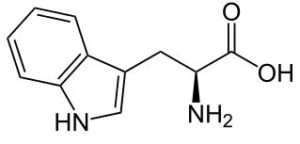
The enzyme Tryptophan hydroxylase converts Tryptophan into 5-HTP (5-hydroxytryptophan).
The decarboxylation of 5-HTP to serotonin is dependent on the presence of Vitamin B6, also called pyridoxal 5’-phosphate (P5P).
The further conversion of serotonin into melatonin requires the presence of SAM-e (S-Adenosyl-L-methionine).
Tryptophan is found in foods like oats, bananas, dried prunes, milk, tuna, cheese, bread, chicken, turkey, peanuts and chocolate.
Eating food containing Tryptophan will increase levels of this amino acid in your body. But not necessarily boost serotonin levels in your brain. Here’s why…
Tryptophan is one of 8 essential amino acids and has the lowest concentration in the body of all the amino acids. Tryptophan requires and competes for active transport to the brain. And competes for the same receptors as the other amino acids.
Research has also found that serotonin levels are enhanced by carbohydrates in your meals because insulin release accelerates the serum removal of some of the amino acids that Tryptophan is competing with.
And if your meal has a higher percentage of proteins, it also slows serotonin elevation in your brain.[iii]
Since Tryptophan from food has issues working its way to your brain to make serotonin, why not skip that step and supplement with 5-HTP instead? Tryptophan and 5-HTP both penetrate the blood-brain barrier. And 5-HTP is the intermediate step in serotonin synthesis.
See my post on 5-HTP for more on why supplementing with 5-HTP instead of Tryptophan is not such a good idea.
How does Tryptophan work in the Brain?
Tryptophan boosts brain health and function in several ways. But two in particular stand out.
- Tryptophan boosts memory. Tryptophan’s main nootropic mechanism of action is as a precursor to the neurotransmitter serotonin. Other neurotransmitters such as melatonin and beta-endorphin increase following Tryptophan supplementation.[iv]
Research shows that Tryptophan and serotonin play a significant role in memory. Enhanced brain serotonin has been shown to improve cognitive performance in animals and humans. And decreasing levels of serotonin through Tryptophan depletion impairs cognition.
A study done in Pakistan assessed memory in rats following Tryptophan administration. The rats received Tryptophan doses of 50 and 100 mg/kg of body weight for 6 weeks. The study showed significant improvement in memory of rats following both doses of Tryptophan.[v]
- Tryptophan enhances mood. As a precursor to serotonin, Tryptophan can have a significant effect on mood. Supplementing with Tryptophan has been found to increase not only serotonin, but growth hormone and prolactin as well.
Researchers infused 11 healthy male subjects with doses of 5, 7.5 and 10 grams of Tryptophan. And then monitored their hormonal and behavioral responses.
Tryptophan produced significant effects on mental and physical sedation but did not increase levels of tranquilization. Tryptophan provided a calming effect without knocking these guys out even at high doses.[vi]
How things go bad
As we get older, our brain chemistry and energy metabolism changes.
↓ Tryptophan levels decline
↓ Tryptophan hydroxylase levels decline
↑ Stress, insulin resistance and age increase
↓ Magnesium and Vitamin B6 levels decline
↓ Neurotransmitter levels decline
↓ Concentration, working memory and executive function decline
↓ Appetite regulation, energy and alertness decline
All of these changes can happen at an age. And are influenced by declining Tryptophan levels. Very little dietary Tryptophan is available for protein and serotonin synthesis. And for many people this can be a problem.
Anxiety, depression, ADHD, memory loss, binge eating and a host of other mental and physical issues have been correlated with low Tryptophan levels.
Tryptophan benefits
Just living in our modern society seems to leave us irritable, stressed-out, and anxious. Worst case is problems sleeping, depression, aggressive behavior, reduced motivation, pain and even suicidal thinking.
 And all have been traced to not enough serotonin in our brain.[vii]
And all have been traced to not enough serotonin in our brain.[vii]
Serotonin, the happiness molecule relies on an adequate supply of Tryptophan for synthesis. Researchers now recognize that the role serotonin plays in psychiatric and behavior disturbances comes from Tryptophan depletion.[viii]
Tryptophan hydroxylase is the rate-limiting enzyme needed for serotonin production. And is involved in the conversion of Tryptophan to 5-HTP (5-Hydroxytryptophan) needed to make serotonin.
This enzyme (Tryptophan hydroxylase) can be inhibited by stress, insulin resistance, magnesium or Vitamin B6 deficiency, or increasing age.
Tryptophan and 5-HTP can penetrate the blood-brain barrier. But Tryptophan requires active transport and competes for the same receptors with other amino acids including tyrosine, phenylalanine, valine, leucine, and isoleucine.[ix]
To complicate things even more, serotonin levels are enhanced by carbohydrates in our diet because insulin release accelerates serum removal of the amino acids competing for Tryptophan transport. And high levels of protein in our diet slows increase in serotonin.[x]
So now you know why it’s helpful to add supplemental L-Tryptophan to your nootropic stack.
How does Tryptophan feel?
Many try L-Tryptophan the first time to cure insomnia or as an alternative to prescription sleep meds.
Dosing L-Tryptophan in the evening will typically ensure you’ll feel great the next day. You should have more energy for working out.
Anxiety levels should decrease. Happiness levels should rise. Tryptophan could help with memory. Music will sound better. Feelings of self-esteem will improve.
Some neurohackers report being able to taper off prescription antidepressant meds by supplementing with L-Tryptophan.
Tryptophan Clinical Research
5-HTP and Tryptophan are natural alternatives for the treatment of depression. And often used as alternatives to prescription antidepressant treatments because they don’t come with the side effects associated with antidepressant drugs.
But as neurohackers we don’t have a lot of research to help us decide if supplementing with Tryptophan makes sense. (If we base our decisions on clinical trials).
Much of the research looks at finding out if low levels of Tryptophan are associated with depression and poor cognition. But there is very little clinical evidence that supplementing with Tryptophan will help reverse low Tryptophan levels. And if adding this nootropic to our stack will boost mood and cognition.
Researchers at the University of Queensland in Australia decided to comb through the research to find out if clinical trials supported the natural health claims of using 5-HTP and/or Tryptophan for depression.
The team located 108 trials of which only 2 studies involving a total of 64 people had sufficient data to qualify. The team concluded that the very limited data showed 5-HTP and Tryptophan better that placebo for alleviating depression. But that larger and more studies were needed before their widespread use could be recommended.[xi]
Low Tryptophan = Depression and Poor Cognition
20 patients in remission or partial remission from depression were studied in a double-blind, crossover design trial. Tryptophan was artificially depleted in these patients so scientists could look at the effects on cognition and mood.
The research team found what we see in real life. Lower levels of Tryptophan had a negative effect on mood, their ability to process positive information, and attention.[xii]
Tryptophan Helps Manage Depression
Serotonin has been recognized as the neurotransmitter that is key to managing depression for the last 30 years. Most of the prescription drug therapies for depression work by raising serotonin levels at the relevant synapses.
We also know that Tryptophan is the immediate precursor to serotonin in the brain. So researchers, using a “what came first, the chicken or the egg” approach decided to find out if low serotonin levels or low Tryptophan levels were to blame for depression symptoms.
Researchers in China analyzed levels of Tyrosine, Tryptophan and serotonin in patients with major depressive disorder. And found that all three were decreased in depressed patients. (Note that Tyrosine is a precursor to dopamine in the brain).[xiii]
The Center for Addiction and Health in Toronto conducted a randomized, double-blind, placebo-controlled trial with 30 depressed individuals. Treatment was fluoxetine (Prozac®) 20 mg per day, 2-4 grams of Tryptophan per day or a placebo for 8 weeks.
Mood was assessed using the Hamilton Depression Rating Scale and the Beck Depression Index during the trial. During the 1st week there was a significant decrease in depression in those who used fluoxetine or Tryptophan.
At 4 weeks the research team recorded a disruption in sleep patterns for those using fluoxetine or a placebo. But not the Tryptophan group.
The team concluded that combining 20 mg of fluoxetine with 2 g of Tryptophan was a safe protocol for treating depression. Patients experienced a rapid decrease in depressive symptoms. And the combination had a protective effect on sleep patterns.[xiv]
DO NOT TRY THIS AT HOME. The trials combining Tryptophan with SSRI’s, SNRI’s and MAOI’s are all done under professional supervision. But remember, Tryptophan is a precursor to serotonin. And antidepressant meds also boost serotonin in the brain. When combined, serotonin levels are boosted even more.
Herein lies the problem. If you increase serotonin too much, you put yourself in real danger of Serotonin Syndrome. Which can lead to all kinds of nasty side effects. Including death.[xv]
DO NOT combine Tryptophan with antidepressant meds unless you are doing so under the careful supervision of a doctor. It is much too dangerous attempting this on your own.
Tryptophan Boosts Exercise Performance
Ever wondered why you cut a workout session short even though physical fatigue wasn’t an issue? Researchers found it could be due to low Tryptophan levels. And its effects on serotonin in your brain.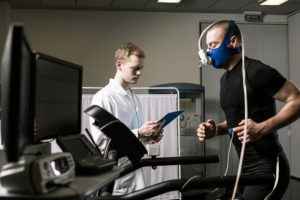
20 healthy young men aged 21 years used a cycle ergometer at about 50% of their physical capacity for 10 minutes followed by maximum intensity exercise for another 30 minutes. This sequence was repeated 3-times, and after the 4th series, each participant continued at the highest speed they could sustain for 20 minutes.
This protocol was performed twice: once with and once without Tryptophan. Researchers found peak power output during the last 20 minutes were higher on trials performed with Tryptophan than those who performed on a placebo.[xvi]
Another trial in Spain recruited 12 healthy sportsmen who ran on a treadmill until exhaustion. Once while supplementing with Tryptophan and once with a placebo.
Total exercise time, perceived exertion rate, maximum heart rate, peak oxygen consumption, pulse recovery rate, and excess post-exercise oxygen consumption were determined during the two trials.
Total exercise time was nearly 50% greater after receiving Tryptophan than after receiving a placebo. Perceived exertion rate was lower when using Tryptophan.
The researchers concluded that the longer exercise time could be due to increased pain tolerance as a result of Tryptophan supplementation.[xvii]
Tryptophan Relieves Symptoms of Seasonal Affective Disorder
Seasonal Affective Disorder (SAD) is a form of depression experienced by many during the winter months. Symptoms include difficulty waking, decreased energy, weight gain, carbohydrate craving, difficulty concentrating, decreased libido, withdrawal, anxiety, depression and irritability.
The first order of treatment is often light therapy. But many do not respond to light therapy typically because of a mutation in the melanopsin gene and the associated signaling pathway between the retina and the pineal gland.[xviii]
The pineal gland in your brain is your source of melatonin which influences sleep cycles. Melatonin is synthesized from serotonin which is synthesized from Tryptophan.[xix]
So if light therapy doesn’t work, possibly supplementing with Tryptophan to stimulate production of serotonin and melatonin could be effective.
Researchers at the University of British Columbia in Vancouver, Canada set out to find if Tryptophan could help those with Seasonal Affective Disorder (SAD) where light therapy failed.
Patients were treated for 2 weeks using light therapy. Those who did not respond to light therapy were treated with 1 g Tryptophan 3-times per day for 2 weeks while continuing light therapy.
The addition of Tryptophan resulted in a significant reduction in depression. 64% of the patients in this study showed very good clinical responses to the combined treatment with minimal side effects.[xx]
Tryptophan Recommended Dosage
Recommended dosage of Tryptophan is 500 – 1,000 mg per day for cognitive benefit.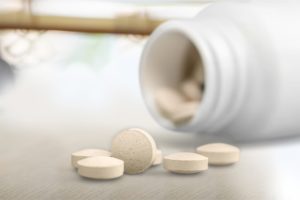
The University of Michigan Health Department recommends much higher doses for:
- Lowering appetite and cravings: .5 – 2 grams per day
- Depression or Anxiety: 2 – 6 grams per day (with medical supervision)
- Chronic pain or migraines: 2 – 4 grams per day in divided doses
- Sleep disorders or insomnia: 1 – 2 grams at bedtime[xxi]
Tryptophan is a precursor to the neurotransmitter serotonin in the brain. Tryptophan hydroxylase is the rate-limiting enzyme needed for serotonin production. And requires magnesium and Vitamin B6 to synthesize serotonin.
Tryptophan is also a precursor to the synthesis of Vitamin B3 (niacin). So if you don’t have enough niacin in your body, supplementing with L-Tryptophan will not efficiently produce serotonin because it’s being used to produce niacin. Which also depletes stores of the vitamin cofactors B1, B2 and B6.
So supplement L-Tryptophan with a B-Vitamin complex that includes Vitamins B3 and B6, and magnesium.
Note that some of the clinical trials used in this post use much higher doses of Tryptophan. Which is not recommended and usually not necessary.
Too much Tryptophan will make you sleepy. And could produce excess levels of 5-HTP and serotonin which can lead to Serotonin Syndrome.
Tryptophan Side Effects
Tryptophan is a normal part of your diet and considered non-toxic and safe at recommended doses.
But in the unlikely event that you already have adequate levels of Tryptophan in your body, supplementing with more could cause problems. As can dosing more that the recommended amount.
Tryptophan could cause stomach upset, loss of appetite, nausea, heartburn, drowsiness, headaches, dry mouth and sexual problems.
Start at the lowest dose to see how your body reacts. When first starting with L-Tryptophan take your dose in the evening to avoid possible drowsiness issues.
Caution: Low to moderate doses of Tryptophan (30 mg per pound of body weight), or about 4.5 grams for the average 165 lb. adult is considered safe and free of side effects. However, most don’t need to dose at nearly these levels.
DO NOT use L-Tryptophan if you are taking antidepressant medications including SSRI’s. Because these drugs delay normal degradation of serotonin in brain synapses leaving more serotonin circulating in your brain.
Too much Tryptophan in combination with these drugs can produce Serotonin Syndrome which can lead to delirium, involuntary muscle contractions, high fever, and coma. And worse case and a very real scenario is death.[xxii]
Type of Tryptophan to buy
L-Tryptophan is available in tablet and capsule form usually 500 – 1,000 mg.
You also get Tryptophan in foods you eat including chocolate, oats, bananas, dried dates, milk, cottage cheese, meat, fish, turkey, and peanuts.
Approximately 300 mg of Tryptophan is available in three ounces of turkey, lamb, beef, tuna, or peanuts. Fortunately, relative to other amino acids, small amounts are needed for a therapeutic effect.
And you get 250 mg L-Tryptophan (as TryptoPure®) in Performance Lab® Sleep which also contains 100 mg magnesium (as Magnesium Bisglycinate, Magnesium Taurate, & NutriGenesis® Magnesium) and 500 mg Montmorency Tart Cherry (as CherryPURE®).
TryptoPure® is made by Ajinomoto Co. Inc. of Japan who have developed a new fermentation process for producing highly effective, bio-identical amino acids.
But there are all kinds of reasons why your body may not be making good use of the Tryptophan you’re getting from food. See “Tryptophan Benefits” for more on why it may be a good idea for you add Tryptophan to your stack.
Nootropics Expert Recommendation
Tryptophan 500 – 1,000 mg per day
 I recommend using Tryptophan as a nootropic supplement.
I recommend using Tryptophan as a nootropic supplement.
Your body does get some Tryptophan from the food you eat. But this amino acid is competing with other amino acids for transport to your brain. It’s competing for the same receptors. And carbohydrates vs. proteins in your meals can affect Tryptophan’s ability to synthesize serotonin in your brain.
Supplementing with L-Tryptophan will make more of this amino acid available to synthesize serotonin and melatonin.
L-Tryptophan is especially helpful for those with low serotonin levels. Boosting this crucial neurotransmitter can help alleviate insomnia, pain, depression and anxiety.
Start with 500 mg of L-Tryptophan per day and take it in the evening. See how your body reacts and how you feel the next day. Increase the dose to no more than 2 grams per day as needed. And watch for side effects.
L-Tryptophan requires adequate levels of Vitamin B3, B6 and magnesium for serotonin synthesis. So add a good B-Complex vitamin and magnesium to your stack when using L-Tryptophan.
And if you’re dealing with insomnia, consider trying Performance Lab® Sleep which contains 250 mg L-Tryptophan (as TryptoPure®).

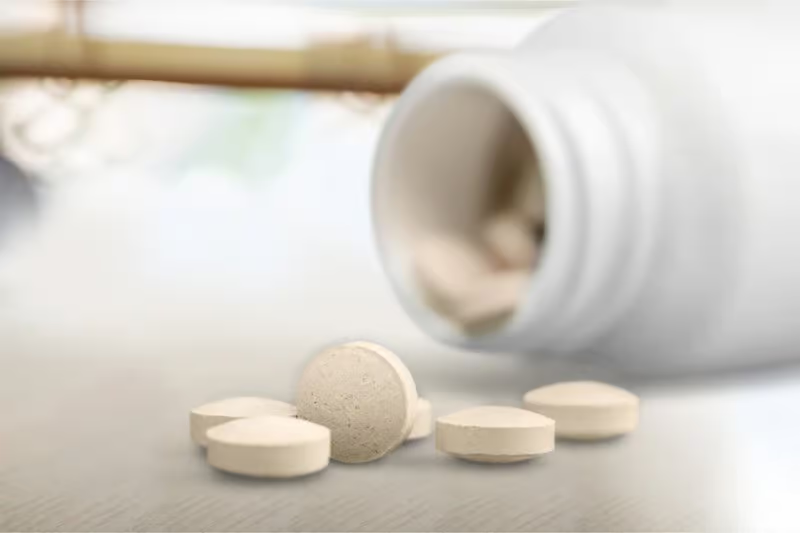
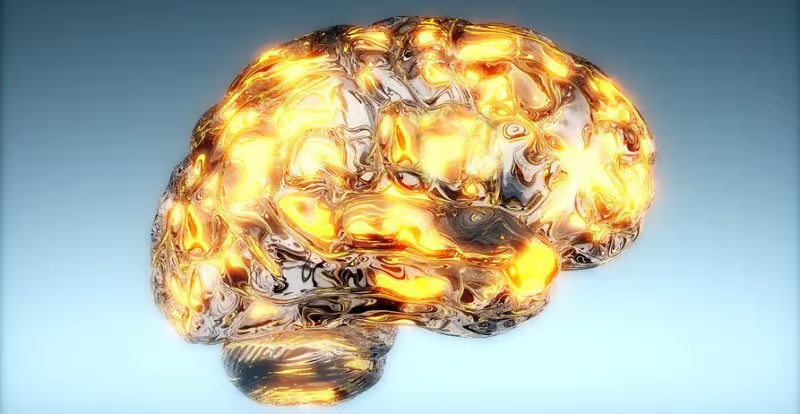






Join The Discussion - 361 comments
Raghavendra
January 16, 2021
I have been taking l tryptophan 1gram and 400gm magnesium glycinate in split dosage , for a week now for my anxiety and sleep issues, and I am not able to find any noticeable effects , I am getting 2nd thought that I have to talk to physicatrist for prescription meds , I need some guide , I am jobless I need to get back to work , I am 23 and scared of external world
David Tomen
January 17, 2021
Raghavendra, L-Tryptophan helps make serotonin. If you are not experiencing any benefit from it then it’s possible your anxiety is NOT a problem with serotonin.
This article explains more causes of anxiety and what to do about it: https://nootropicsexpert.com/best-nootropics-for-anxiety/
And for sleep: https://nootropicsexpert.com/best-nootropics-for-sleep/
Ian
January 13, 2021
Hi David
Do we build up a tolerance to Tryptophan (or most nootropics) I was taking 2-4g of tryptophan per day for 2 weeks and I had instant feelings of a cooling feeling and felt great. Now I don’t feel anything when I take it. Do I need to cycle it or increase dose?
Thanks
David Tomen
January 13, 2021
Ian, it is unlikely you developed “tolerance” to L-Tryptophan. It is much more likely that such high doses of L-Tryptophan increase serotonin to the point that it started depressing dopamine.
Serotonin and dopamine must be in balance.
Dim
January 3, 2021
Dear Mr Thomen,
Is supplementing with Tryptophan safe on the long-term (6 months – 1 year)?
What is the highest but safe recommended dosage and the best time to take it for depression?
Thank you in advance
David Tomen
January 4, 2021
Dim, I personally use 500 – 1,000 mg L-Tryptophan per day before bed. And have been doing it for years. It’s perfectly safe as long as you also do something to increase dopamine. Because serotonin and dopamine must be in balance. If you raise serotonin too high you’ll depress dopamine. And vice versa.
4.5 grams of L-Tryptophan for the average 165 lb. adult is considered safe and free of side effects. But most don’t need anymore than 2 grams per day even for treating depression. Higher than that I suggest doing it in cooperation with your doctor.
Dimitris
January 5, 2021
Thank you very much for your generous help
tom
November 26, 2020
Dear David,
What is the subjective sensation of low serotonin vs. low dopamine?
How can you tell the difference?
Best regards,
-Tom.
PS. Thank you for the wonderful site.
David Tomen
November 28, 2020
Tom, thank you.
I suggest googling “low serotonin symptoms” and then “low dopamine symptoms”. There are too many to list here. The first couple of returns in your search results should provide that list.
When you compare the too lists there are marked differences. Buy also some similarities. Such as anxiety and depression for both.
NM
November 26, 2020
does tryptophan decrease dopamine (compete for receptors)?
i tried taking tryptophan and had serious heart palpitations (pounding in my chest). what could cause this? i was hoping to try 5HTP, but it looks too risky.
i’m hoping for a solution to a long-term depression, insomnia, and inability to engage. i no longer do anything that i used to love to do. would appreciate any help.
thanks
David Tomen
November 27, 2020
Nancy, both dopamine and serotonin synthesis are dependent on the Aromatic l-amino acid decarboxylase (AADC) enzyme. L:-Tyrotophan/5-HTP uses that enzyme to convert to serotonin. And L-Tyrosine uses that enzyme to make dopamine.
If you flood your brain with L-Tryptophan you end up with depleted dopamine. And vice versa if you flood your brain with L-Tyrosine.
You also have serotonin receptors in your heart. While too complicated to go into here it explains why using L-Tryptophan or 5-HTPc an cause heart palpitations in some people. It sounds like you are one of those people who needs to avoid Tryptophan AND 5-HTP.
Depression and insomnia can be caused my many other things other than not enough serotonin or melatonin. Please see my article on depression for more on this: https://nootropicsexpert.com/best-nootropics-for-depression/
Arj
November 16, 2020
Hi David,
Google search returns many articles linking Tryptophan and aging. Can you please look into that?
David Tomen
November 16, 2020
Arj, you are likely encountering lots of article about Tryptophan and aging because this is a new area of research. And it looks promising. But has not been completely sorted out.
It appears that Tryptophan metabolism is anti-aging. And a reduction in Tryptophan metabolism leads to all kinds of inflammatory diseases associated with aging. This article in Frontiers in Immunology is a good example of the research so far: https://www.frontiersin.org/articles/10.3389/fimmu.2019.02565/full
But it doesn’t say that if you use L-Tryptophan every day you’ll live longer. It kinda’ looks that way. But the jury is still out.
piyush
October 12, 2020
I cannot understand this .
90% of Nootropics stack (MindLab Pro and Qualia Mind) Doesnt have L-Tryptophan in their formulation.
Biohackers seems to recommend talking NALT,Lions-mane,Bacopa,AMPAkines and choline .
But how can they forget L-Tryptophan in their formulation
Doent High dopamine from Dopamine supplements (NALT,Uridine and Ampakines) causes low serotonin … which can cause symptoms like depression and cognition issues ..
David Tomen
October 13, 2020
Piyush, not sure about Qualia Mind but I know that Mind Lab Pro does contain NALT which directly increases dopamine. But the dose is not high enough to throw your dopamine/serotonin levels off balance.
You may be right about other pre-made nootropic stacks. But you don’t have this worry with Mind Lab Pro. It’s a beautifully balanced and effective nootropic stack. If you added L-Tryptophan to the formula and took it in the morning you would counter the effectiveness of this stack. And likely want to lay down and take a nap.
Most biohackers who raise dopamine levels high enough to worry about lowering serotonin simply use 500 mg L-Tryptophan before bed. It helps you sleep and brings serotonin and dopamine back into balance so you’re ready for the next day.
piyush
October 14, 2020
Yes .
My original Stack is : agmatine + NALT + Forskolin + ALCAR + Omega3 + Multivitamins/Multiminerals(Magnesium) + L-Theanine + Tianeptine(Prescription)
Before adding L-Tryptophan in this stack .. I used to get only mild results .
But after adding 1 Grams of L-Tryptophan in the stack…Nootropic Effects is increased by a very large margin
I Researched Pubmed to understand this Effects and Got these explanation…
: My Brain have large percentage of Acetylcholine (due to past usage of Cholinergic like bacopa,nicotine,ashwagand,CDP-Choline) and Very low percentage of Monoamines (Happy and Reward chemicals)
I will probably add AMPAkines like Resveratrol and Rhodiola in near future … as Racetams are not available in my country.
Jazmin
September 30, 2020
Hi David! I recommended my sister to take tryptophan to sleep better and improve her mood. She started taking 500 mg then increased to 1000 mg but she didn’t feel any effect. She also told me that with medicine is usually the same. Is there any reason? You think 5htp would be better? Thanks!
David Tomen
October 1, 2020
Jazmin, when you don’t experience any effect from a supplement it usually means that your levels of that supplement are already high in your system.
Or with using L-Tryptophan for sleep the expectation is that your body and brain convert tryptophan to 5-HTP to serotonin to melatonin. If there is a problem with that conversion process there won’t be an effect.
You could try low dose 5-HTP. And I stress low dose! No more than 100 mg and see if that helps. If that still doesn’t work then there is a problem somewhere between 5-HTP and melatonin.
The decarboxylation of 5-HTP to serotonin is dependent on the presence of Vitamin B6, and pyridoxal 5’-phosphate (P5P). You could be low in P5P.
The further conversion of serotonin into melatonin requires the presence of SAM-e (S-Adenosyl-L-methionine). You could be low in SAM-e.